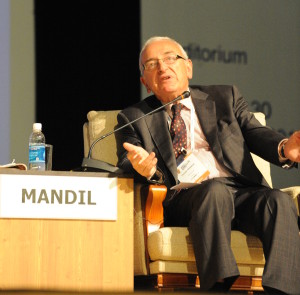“This problem is too big for any single nation to solve by itself,” said Gadonneix. “There is no way we can reach the 2050 emission targets unless countries agree to cooperate on carbon capture.”
Gadonneix called for political leaders to be candid in sharing information about environmental and safety issues with citizens. Speaking during a panel session on problems of governance in energy policy around the world, he urged leaders to tell their people, “Not everything is possible, everything has a cost, and some things have to be solved through international cooperation.” Gadonneix said international cooperation on safety issues is relatively easy because everyone see benefits from sharing information. Collaboration on environmental issues is a bigger challenge, he said.

Neil Hirst, Senior Researcher at London’s Imperial College stressed, however, that if the IEA wished to play a central role in energy governance, it would have to expand its membership to include nations that are not OECD members. “The IEA right now represents the world as it was 40 years ago,” said Hirst.
Mandil countered that the IEA is the only institution at present that has the human resources and accumulated skills needed to play a key role in strengthening governance in energy. Commenting on the difficulties United Nations Framework Convention on Climate Change has encountered in setting international targets on greenhouse gas emissions, Mandil said, “You cannot expect to reach agreement through an organization that has 200 members. IEA has a lot of the skills and habits ideal for sharing best practices.”
Ibrahim Muhanna, an Advisor to the Saudi Arabian Petroleum Ministry, said organizations representing energy producers and consumers had not cooperated in the past, “unless there was a crisis.” The IEA only represents advanced energy consuming economies. Panel discussants agreed that non-Western countries needed to be accepted into the IEA for the organization to be able to act globally. China, India, Russia, and South Africa were mentioned as potential new members of an expanded IEA.
This news story is based on the What does It Take? session, “Stalled international energy governance”, at the 2013 World Energy Congress.





